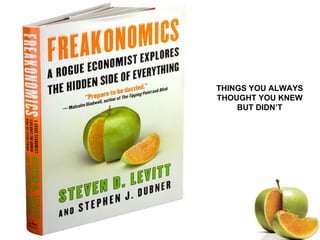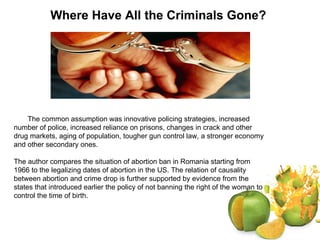Freakonomics
- 1. THINGS YOU ALWAYS THOUGHT YOU KNEW BUT DIDNˇŻT
- 2. Which is more dangerous, a gun or a swimming pool? What do schoolteachers and sumo wrestlers have in common? Why do drug dealers still live with their moms? How much do parents really matter? How did the legalization of abortion affect the rate of violent crime?
- 3. What is Freakonomics? Freakonomics is a new field of study introduced by Levitt (an economist) and Stephen J. Dubner (an award-winning author and journalist). They usually begin with a mountain of data and a simple, unasked question. Some of the questions concern life-and-death issues or are rather freakish quality. Economics is considered as a subject of uninteresting financial trends and market developments which is not true. The author reveals through real life examples that the tools of economic research can be useful in the study of the relationships that underlie the events and problems that we encounter and hear about every day. Thus the book name - Freakonomics
- 4. Introduction: The Hidden Side of Everything The book is based on four fundamental ideas: 1) Incentives are the cornerstone of modern life. 2) Conventional wisdom is often wrong. 3) Dramatic effects often have distant, even subtle, causes. 4) "Experts" use their informational advantage to serve their own interests. knowing what to measure, and how to measure it, is the key to understanding modern life
- 5. What Do Schoolteachers and Sumo Wrestlers Have in Common? Cheating, like almost everything else that involves incentives, can be predicted Research processes made the author identify a number of Chicago public school teachers who cheated by helping their students cheat. He analyzed standardized test answer patterns and identified suspicious blocks of correct answers, also comparing test scores to studentsˇŻ past academic performance. Also research projects involved the analysis of the scores and bout records of JapanˇŻs elite-level sumo wrestlers. He analyzed and compared the performances of the wrestlers in matches with vastly different stakes and potential consequences. The story of an entrepreneur who sold bagels using the honor system to office workers in Washington, D.C. concludes the chapter. The owner kept detailed financial records, and by analyzing them, author was able to discern a number of remarkably consistent patterns in the behavior of those who took bagels without paying for them.
- 6. How is the Ku Klux Klan like a Group of Real-Estate Agents? information asymmetry is one of the most powerful economic tools Stetson Kennedy helped cripple the racist Ku Klux Klan during the era of world war ¨CII simply by widely disseminating their secrets. He systematically documented the secret rituals and codes of the organization and supplied the records to Hollywood writers, who used the information on radio. Children across the United States imitated the shows in their schoolyard games, and gradually, the mystery, grandeur, and influence of the group were profoundly diminished. Analyzing data about real estate agents common practices when they are selling their own houses, shows that not always do they have their clientsˇŻ best interests at heart.
- 7. Why Do Drug Dealers Still Live with Their Moms? Because most of them don't make much money. Based on unbelievably detailed records of an actual Chicago neighborhood gang, the author found that, while the leader (who's now in jail) made $100,000 a year (tax free) over four years, his officers made only $700 a month and his foot soldiers made only $3.30 an hour, less than the minimum wage. "They had no choice but to live with their mothers." He compared this scenario with a high-school quarterback (position in American and Canadian football) and an editorial assistant.
- 8. Where Have All the Criminals Gone? ?????? The common assumption was innovative policing strategies, increased number of police, increased reliance on prisons, changes in crack and other drug markets, aging of population, tougher gun control law, a stronger economy and other secondary ones. The author compares the situation of abortion ban in Romania starting from 1966 to the legalizing dates of abortion in the US. The relation of causality between abortion and crime drop is further supported by evidence from the states that introduced earlier the policy of not banning the right of the woman to control the time of birth. ????????
- 9. What Makes a Perfect Parent? W hat is important in parenting is who you are, not what you do. The author estimates that a child is more than 100 times more likely to die in a swimming pool than playing with a gun Positive parenting outcomes are linked more strongly to factors such as socioeconomic status and parental education than any specific parenting practices. Important factors in determining high standardized test scores in children include highly educated parents, high socioeconomic status, maternal age of greater than thirty when the child was born and low birth weight. Not important factors are: the family is intact, the parents recently moved to a better neighborhood, the mother didn't work between birth and kindergarten, visit to museums, regular spanking, watching television, reading to the child every day.
- 10. Would a Roshanda by Any Other Name Smell as Sweet? Obsessive or not, any parent wants to believe that she is making a big difference in the kind of person her child turns out to be. Otherwise, why bother? This is proved by the booming baby-naming industry. in 1958, a New York City man named Robert Lane decided to call his baby son Winner. Three years later the 7 th boy was named Looser. It was explained that the deeds were opposite. The Temptress example, actual name intended Tempestt Bled-soe Black and white habits completely differ. Distinctive names by blacks A unique super black name signal of solidarity with the community
- 11. ˇ° This book is a brilliant, provocative investigation into motives: what they are, how they can be changed, and how they affect what people do. It is also a deceptively easy read: its style is so light, its tone so sunny and humorous, that it is hard to realise the extent to which the arguments in Freakonomics attack some of our most basic assumptions about the way people, and society, work.ˇ±ˇŞ The Sunday Telegraph










